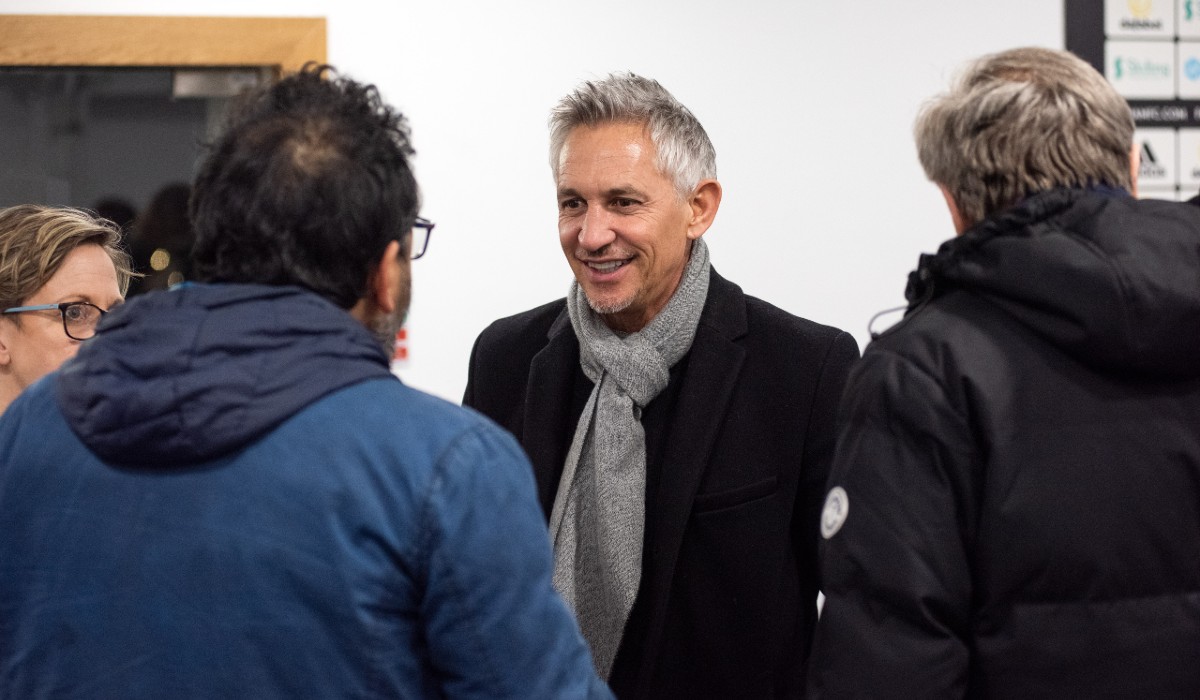 Gary Lineker Fulham FC event 2020. Photo: Flickr / MG_HF_Football Training_29 / CC BY-NC-ND 2.0
Gary Lineker Fulham FC event 2020. Photo: Flickr / MG_HF_Football Training_29 / CC BY-NC-ND 2.0
Des Freedman writes on what the controversy over Gary Lineker tells us about the broadcaster
The BBC’s suspension of Match of the Day presenter Gary Lineker has been a long time coming. The immediate cause was a series of tweets that declared his passionate opposition to the government’s proposed Illegal Migration Bill and his claim that the government was using language to demonise asylum seekers that was resonant of Germany in the 1930s. This, the BBC has argued, flies against the requirement of presenters associated with the BBC not to make public pronouncements on ‘controversial’ matters as it would fall foul of its rules concerning ‘due impartiality’.
The underlying reason, however, is the BBC’s historic connection to and compliance with government and its reluctance to be associated with political positions that might further antagonise the right-wing press and jeopardise the Corporation’s financial future.
Of course it’s true that the BBC’s enemies in the tabloid press and parliament will use any opportunity to bash the Corporation as part of their ‘culture war’ against any semblance of progressive politics. But if the BBC thought it was defending editorial independence and ‘due impartiality’ by taking this action, it couldn’t have got it more wrong. Giving way to pressure from the right – whether the Mail and Express or shrill social media voices like former Sun editor Kelvin Mackenzie or former culture secretary Nadine Dorries – doesn’t insulate the BBC from the government or protect its beloved impartiality regulations. Instead, it undermines its reputation and makes its commitment to independent journalism a bit of a joke.
Remember that it was the BBC that decided to lead its bulletins with the Lineker story eclipsing what ought to have been the headline: the government’s war on asylum seekers and its legislation to stop small boats crossing the Channel that has been described as ‘racist, illegal and unworkable’.
Cowardice and hypocrisy
The whole affair reeks of cowardice and hypocrisy. Why did BBC bosses not think that Alan Sugar’s tweets about Corbyn were not a problem given that he was the host of The Apprentice at the time? Even more significantly, given that this was directly related to news, why did they think it was OK for Andrew Neil to edit the Spectator and pump out Tory narrativesat the same time at fronting a ‘flagship’ BBC news and current affairs programme.
Why do BBC bosses think that their own intimate connections to the Tories don’t present a threat to perceptions of impartiality, but the private views of a single sports presenter will somehow bring the whole public service project crumbling down? We now have the obscene spectacle that Lineker has been suspended while the BBC chair, Richard Sharp, a former Goldman Sachs banker, adviser to Rishi Sunak, Conservative donor and, most recently, broker of an £800,000 loan to Boris Johnson, remains in his job along with BBC director general Tim Davie, the former deputy chairman of Hammersmith & Fulham Conservative Party who is ultimately responsible for this mess.
Meanwhile, we could really do with an effective Opposition. Senior Labour figures like shadow attorney general Emily Thornberry and shadow home secretary Yvette Cooper initially condemned Lineker’s comments- naturally playing to Keir Starmer’s determination to say nothing that might upset floating voters (many of whom will of course agree with Lineker) – before magically deciding that perhaps the BBC had over-reached itself. This kind of hypocritical flip-flopping will do nothing to suggest that Labour will fight on behalf either of asylum seekers or licence fee payers. In fact, the real opposition to the government’s pernicious asylum legislation has been provided by Lineker himself and the wildcat strike carried out by assorted pundits, commentators and broadcasters all of whom have demonstrated what solidarity means more than the Labour front bench.
Elites
The fact is that the BBC has always been far more accountable to British elites than to the licence fee payers who actually fund its services. The best of its drama might occasionally tackle social issues but its everyday news output is fixated on stories and frames that resonate with the agenda of the Daily Mail and Telegraph that, according to journalist Robert Peston, dominate the newsroom, and that will not upset ministers.
Its commitment to ‘due impartiality’ doesn’t guarantee fearless and independent reporting but instead provides a means by which it can police an elite consensus. This means that it’s a reflex reaction for the BBC newsroom to reproduce a view of the world that suits the powerful and to attack those – like Jeremy Corbyn who was regularly the object of negative BBC coverage – who dare to challenge existing domestic and foreign policy priorities.
It may be uncomfortable for some traditional defenders of the BBC to acknowledge that the Corporation is acting more and more as a ‘state broadcaster’ but how can we see it otherwise when it so consistently buckles under government pressure – or worse, buckles even at the thought of a. telling-off from Downing Street. If you don’t want to be seen as a tool of government, then don’t behave like one.
Sign the petition to reinstate Gary Lineker to Match of the Day
Join Revolution! May Day weekender in London
The world is changing fast. From tariffs and trade wars to the continuing genocide in Gaza to Starmer’s austerity 2.0.
Revolution! on Saturday 3 – Sunday 4 May brings together leading activists and authors to discuss the key questions of the moment and chart a strategy for the left.

